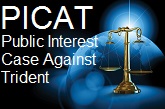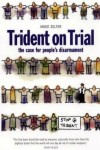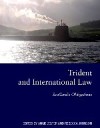by Kevin Lister
Given that the drip feeding of climate change news is starting to become a flood, by now we probably have all been stuck in dinner parties or pubs with self appointed experts claiming either cow methane, cars, planes or China are the biggest cause of climate change, depending on what particular vested interests they have. I would humbly suggest they are wrong - the biggest cause of climate change is Trident. Unless we wean ourselves off our addiction to nuclear weapons, we will never implement the climate change solutions to address those causes that are the common topics of dinner party debates and our fate will be sealed.
This is an article that no one really wants to write and no one really wants to hear, but it is hopefully something that will start building stronger bridges between the two most important issues facing us today; runaway climate change and nuclear weapons proliferation. To link these explicitly is as much a challenge to camps leading campaigns against climate change and nuclear weapons as it is to the elites of society who threaten to destroy us through their hubris and arrogance. Because of the intensity of their campaigns few people in one camp can afford to devote time to understanding those in the other and they must actively compete against each other for the ear of politicians and the media; the climate change people argue that climate change is our biggest threat and the anti nuclear weapons campaigners argue that nuclear war is our biggest threat. The reality is that they are both correct and the principle of divide and rule is being implemented to perfection.
The other reality is that the world is so damaged it will never be as good a place to raise children as it was only one generation ago. The job of campaigners now is to unite, acknowledge this and work together on a damage limitation exercise to avoid the worst case scenario of runaway climate change and nuclear war combining together.
To put this crisis into context, we know we have exceeded the safe limit of CO2 to avoid runaway climate change. We know also the rate of increase of CO2 in the atmosphere is growing super exponentially[i] and exceeding the worst case scenario of the 2007 IPCC report which will lead to the loss of all life on the planet[ii].
Figure 1 CO2 trends, courtesy of Copenhagen Diagnosis
Instead of taking action on this reality we continue to force our ecological systems closer to collapse which forces the global system of governance to a similar state of collapse. The results are self evident. Wars and financial collapse are now the order of the day destroying millions of lives. One of the erupting fault lines is Syria. It suffered a protracted drought over a three year period, killing 85% of all its livestock and converting the Middle East’s major wheat producer into a wheat importer at the mercy of world food prices[iii]. This war has little to do with Assad being evil and nasty, instead it is a nasty and evil climate change war[iv]. It is a warning for what lies ahead for other societies as they become destabilised through climate change. The fact that Syria is a dictatorship simply means it goes to the front of the queue for collapse as its government has little legitimacy either externally or internally.
As the realisation dawns of impending collapse government decisions on all things from aviation to energy policy are simply caveated with the statement that we need major policy change to tackle climate change. However, none ever dare talk of the policy changes needed. By contrast, policy is actually set to ensure business as usual continues irrespective of the damage caused. To support this, governments feed their populations the tempting idea that an economy addicted to intensive use of fossil fuels can be easily transformed into a zero carbon economy with no changes to the philosophies and economic systems that govern us. They tend to be successful at this as people always hear what they want to hear and disregard the rest. It is also what the most powerful corporations that governments have become beholden to want to hear.
Meanwhile international climate change agreements also continue to ignore the reality by failing to agree emissions cuts year after year. As time is running out, we should finally acknowledge that this façade has to stop and that the deep rooted flaws must be acknowledged. Unless we acknowledge these, we will destroy our planet.
The structural flaw is actually simple and obvious. Our planet is divided into nation states that compete militarily or economically for survival. There is a symbiotic relationship between the two. Any nation that decides not to compete faces an existential threat. Baring a couple of World Wars, this competitive engagement served humanity reasonably well when there was space for economies to continue growing and some great achievements resulted such as getting man to the moon. However, once limits to growth are imposed, and nations continue to implement economic policies that require exponential growth, competitive engagement between nation states is doomed to become deadly.
The ultimate limits to growth are climate change and peak oil. In the near total absence of viable technical solutions, the only response to these limits is painful and difficult mutual sacrifices which can only be achieved through co-operation. This is the antithesis of our competitive environment; so nations are trapped between the devil and the deep blue sea. If a nation co-operates on climate change by slashing its economy to reduce energy consumption and greenhouse gases it might be destroyed by its increasingly desperate competitors as they face climate change disasters of their own. However if it continues to compete against its competitors for survival it will definitely be destroyed through climate change, along with everyone else. It is not really a great choice, but co-operating to fight climate change on balance is a slightly better bet if you can improve the odds by eliminating competition.
It is therefore a pity that competition remains the thing that we glorify and is the essence of industrialisation. We have a government that loves our Royal family and all things nationalistic, the press cheered on British teams in the Olympics and we think it is great when our companies compete abroad to secure contracts and resources. In amongst all the UK flag waving, hardly anyone batted an eye lid when the government announced a £1billion contract to start building the nuclear reactors for Trident class submarines[v]. Our competitor nations are forced to play the same game. By contrast the idea of cooperating on mutual threats is deemed by the press, politicians and much of the public to be subversive and dangerous. So the move to a co-operation based society requires the biggest ever change of mindset and the boldest decisions mankind has ever made. If we fail we will be trapped in a zero sum game were pre-emptive attacks by the strongest before they are weakened through economic contraction become a reality.
The ultimate competitive statement a nation makes is with its military. The apex of this is the ability to terrify any potential competitor by the possession and deployment of nuclear weapons along with a credible threat to use them. The inherent failure of this strategy is that nuclear weapon systems require massive energy hungry military industrial complexes to build both the nuclear weapons systems and the conventional forces to defend them. In turn, this needs an expanding economy that must consume to excess to raise the necessary taxation and the governments must lie to their population about the inherent danger of doing this in a zero sum game. Any competitor nation must make the same calculations and protect the same falsehoods, irrespective of being a dictatorship or a democracy.
The industry needed to build weapons of mass destruction always ends up as a strategic industry that must be protected and nurtured. This is done by feeding it with a continual stream of new contracts. The Russians did this in the 1990s when they continued building the Akula class attack submarines despite the nation being bankrupt. The UK and the USA are about to do the same with the Trident replacement programmes. The initial gate document[vi], giving the go ahead for early procurement of Trident components is remarkably open and honest about this. It stated that the objective of proceeding was that, “We must retain the capability to design, build and support nuclear submarines and meet the commitment for a successor to the Vanguard Class submarines.” In other words, we will build Trident submarines simply to continue building Trident submarines. By this logic, we and our competitor nations will continue building nuclear submarines forever, irrespective of the environmental costs. The UK government resolutely refuses to even contemplate quantifying the carbon budget of the Trident replacement[vii]. This forces all sides into a race to grab the last available resources on the planet to maintain the exponential economic growth needed to raise taxes. This further destabilises global security strengthening the case that is made to populations for nuclear weapons development.
This race to destruction has caused world wide spending on nuclear weapons to reach a new height of $1 trillion per year[viii] requiring massive economic activity to raise the taxes. It is impossible for any government caught up in it to agree to co-operate on climate change talks. It also makes it impossible for governments not caught up in the nuclear race to make climate change agreements, as they will always be under threat from the voracious appetites of those that are.
To fully understand the danger that we are facing, economic growth of 3% means a nation’s economy doubles in size every 23½ years. Even more seriously, in this doubling period, a nation will consume the same amount of resources as it has ever consumed since its inception. It will also create the same amount of pollution as it has ever created. It will do this at a time when wars are already being fought for the last remaining global resources and when the climate is crashing through the greenhouse gas overload.
This is a death spiral that we are being forced on by a dangerous combination of national pride, ignorance and the vested interests of the world’s military industrial complex. To stop it, we must unequivocally link the failure of nuclear disarmament with the failure to address climate change.
History provides us with ample warning of the danger and perfect case studies. One of the best being the escalation of tensions to an unsustainable level between Germany and Britain as they both strained their economies to breaking point in a race to build the biggest super Dreadnought battleship fleet. The result was total war. The victims were the working classes, the beneficiaries where the owners and shareholders of the big industrial companies in both countries.
If the First World War was not enough of a lesson, history obliged again with another repeat example, this time in Iraq. In the calculus of Tony Blair and George Bush they knew that delaying the start of the war was not possible, as their economies would be weakened by rising oil prices and Sadam Hussein’s would be strengthened, so they struck when they still has the strength to do so.
Tony Blair acknowledged this in the Chilcott enquiry. He said of the decision to justify a first strike that, “It is at least surely arguable that he [Sadam Hussein] would have not changed, been there with a lot of money and the same intent.[ix]” The dynamics of a zero sum game forced the decision for a disastrous preventative war. It was a risk that they had to take to maintain the economic growth to raise the taxes for Trident and the other overheads of nation state competition. To put this in perspective, the Trident System replacement will cost the UK over £100 billion.[x] Crudely, this will require a nearly bankrupt nation to create nearly £500 billion of unnecessary economic activity to raise sufficient taxes. In a desperate zero sum game, this can only be done by the desperate use of force and further catastrophic damage to the environment. The Iraq war was one of those environmental catastrophes. The American Petroleum Institute calculated in the first three weeks the allied forces used the same amount of fuel as was used by the allies in the whole of the First World War, making it the most energy intensive war ever. In addition the large scale use of depleted uranium rendered large parts of the country uninhabitable, even if they were not already set to become uninhabitable from climate change.
Figure 2 World Oil Prices and the road to the 2nd Iraq War
As well as declared war, we turn a blind eye to the undeclared wars that multi-nationals declare on our behalf such as the destruction of Niger delta by Shell or the murder of indigenous people in the tropics to make way for biofuel plantations.
The possession of nuclear weapons becomes the most powerful statement any nation can make to the rest of the world that it is not prepared to make sacrifices and co-operate on climate change. It says that they intend to preserve the destructive status-quo of economic growth and militarisation irrespective of the cost to the planet. It is no coincidence that the repeated annual fiasco of the Climate Change Conference (COP) revolves around the positions of the nuclear armed nations; namely USA, China, India, UK, Russia and France. Each refuses to commit to the CO2 cuts necessary to minimise the worse effects of climate change. Instead they offer bogus protestations of virtue about how they are committed to finding a global solution, or how they will pay the developing nations to make cuts on their behalf through carbon trading or how they will support agreements that are ineffective or unenforceable.
Possession of nuclear weapons is the ultimate Faustian bargain mankind could ever envisage.
This is why negotiations for nuclear disarmament and climate change must be brought together – Britain must put its nuclear weapons on the climate change negotiation table, and persuade others to do the same. Maintaining Trident as the UK does to “allow us to punch above our weight” is wholly incompatible with working as an equal to tackle climate change. In contrast, by offering our nuclear weaponry in climate change negotiations, we say to the world that we are more concerned about global co-operation than national self-interest. By doing so, we offer all players in the world a chance to join a new paradigm.
Within this new paradigm, the opportunities to implement genuine alternatives to our destructive capitalist system become possible, such as the introduction of carbon rationing or carbon taxation. This stops the absurdity of our current economic system where the top 5% of society are responsible for about 30% of greenhouse gas emissions through their excess consumption[xi]. At the other end of the income scale, the bottom 30% of society is responsible for only 5% of emissions, whilst simultaneously being exposed to increased risk of hardship as global resources tighten.
Thus an intimate and circular relationship exists between the three big campaign issues of today - climate change, nuclear disarmament and social equity. Climate change requires mutual sacrifice at all levels of our global society. This cannot be done in the competitive environment that the nuclear-arms race reinforces. Social equity cannot be achieved in a zero sum game without a rationing based economy. A rationing based economy is essential to making the mutual sacrifices to addressing climate change. One campaign cannot be won without winning all three simultaneously. To win these battles, we must start by attacking the control that the military industrial complex has over our society and the power that it gives the most powerful governments. We must recognise that the military and the arms industry that once freed us from tyranny have become a tyranny that is destroying us all.
So the young people of today are faced with three future scenarios.
The first scenario is the “Easter Island Scenario.” In this scenario the planet becomes largely uninhabitable through climate change by 2050. The last survivors are the crews of the nuclear submarines that are cruising the world’s oceans targeting abandoned cities with their missiles. There will be no economic resources to decommission these and they will forever remain as a deadly liability for anyone that survives. In this scenario the Trident submarines become the modern day equivalent of the Easter Island statues – ridiculous statements of political vanity and hubris built in the face of clear evidence of total collapse. This is the strategy that the governments of the world’s most powerful nations are actively, but unintentionally, pursuing.
Figure 3 – Today’s economic Strategy
The second scenario is that the nuclear build up continues amid increasing international tensions brought about by the fundamental advantage that comes with a first strike in a zero sum game and a catastrophic nuclear war is either deliberately or accidentally started. With tensions increasing from climate change and the stealth characteristics of modern weapons systems, battlefield commanders have seconds to make critical decisions in high stress environments. They can easily find themselves making an inadvertent premature launch decision provoking large-scale nuclear war. The radioactive nuclear winter the planet will be plunged into will temporarily halt catastrophic global heating but will also mean that what little food can be grown will be too poisonous to eat. After a few years, once the dust settles, heating will resume. The weakened survivors will succumb and our once beautiful planet will be devoid of life.
Figure 4 The worse case climate change scenario
The third scenario is that the organisations committed to environmental and social stability globally dominate and overturn the power that big corporations and the military industrial complexes have on their governments. Having done this they are able to implement an economic system that allows the distribution of resources against the background of a globally heated planet and implement plans for survival.
This final scenario draws its inspiration from the Christmas day truce in the First World War, where the participants met to play football. In the horrors of trench warfare they took the first opportunity they could to communicate directly with each other to stop the fight and co-operate for their survival. In spite of this, they were forced to continue fighting to the death by the power interests of the military industrial complex that equally dominated both sides. They lacked the communication infrastructure, knowledge and organisation to continue their fight for survival. Today the internet gives the global community all three. The question is, will the majority of the world’s population be able to use it in their fight for survival against the centres of global power?
Figure 5 The people refuse to compete
Like all fights, there is never any guarantee of success. If nuclear weapons can be forced into climate change agreements it does not guarantee escape from climate change catastrophe. However if the worldwide nuclear weapons build up is allowed to continue it does guarantee our extinction.
——————————————————————————————————-
Kevin will be instigating a project to quantify the complete carbon footprint associated with the world’s nuclear weapons races. If you would like to support his project and become involved, please contact him on [email protected]












 Nuclear weapons crime in the UK has been reported to Thames Valley Police.
Nuclear weapons crime in the UK has been reported to Thames Valley Police.










